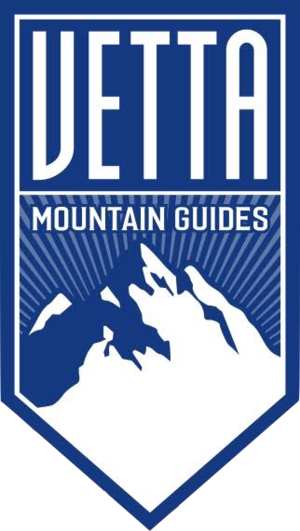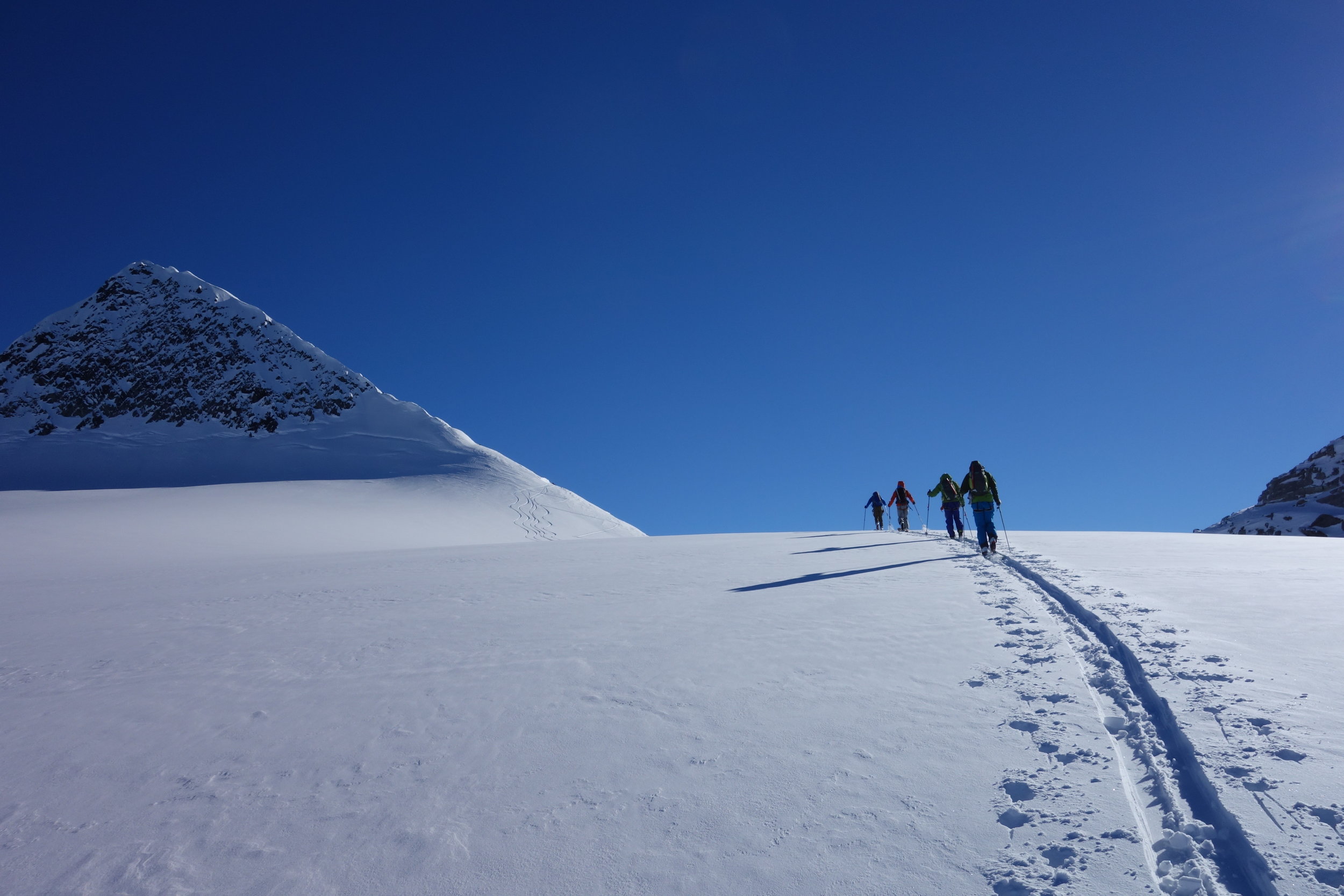“They just had it out for me,” said my buddy. “They wanted me to fail.”
Disappointment, resentment, and probably a little embarrassment in there, all emotions that derail us from learning … if we let them.
My friend had just discovered he’d failed an exam with the American Mountain Guides Association (AMGA). That’s a bummer for a bunch of reasons, not the least of which is cash – exams are expensive, especially when you consider travel, missed work, lodging, the works. I bet my ski exam was towards $4K, including travel to Revy, sharing a huge house there, tuition, gear, etc. And forget the stress involved. Then consider spending another year of your life in “prep mode” again, training, watching conditions, feeling an exam looming over the horizon, all of it reminding you “it’s not quite done.” And of course, we all want to feel competent—failing means we’re not quite there yet.
Candidates approach Sapphire Col on their AMGA Ski Mountaineering Guide exam, 2014.
So, my buddy had failed and was looking at another year of prep and another few thousand dollars. Ouch. He wanted to lock down a few days of training this coming winter, but in the meantime we talked strategy.
“Every day you go out, between now and the exam, debrief the day ruthlessly and identify where to improve,” I suggested as a concrete, daily strategy for addressing weaknesses.
“Yeah, I play their little game during the exams,” my buddy retorted. “On my own, though, I don’t do that shit.”
Woh. I was taken aback. The military, in aviation, in medicine, and guiding—the debrief is your free daily dose of improvement, if you’re willing to do it, sincerely and conscientiously.
“I don’t know,” I said, trying to nudge the guy towards my way of thinking. “You don’t need to make a huge deal of it, but it does allow you to try and improve each day, incrementally.”
I don’t think I convinced him. He was smarting from his “no-pass” and I certainly didn’t want to argue with him or point out “another” area of concern for him.
But in the days and weeks after our conversation, I returned to the idea of the debrief. It allows each and every one of us, and our teammates, to identify anything from the tiniest mistake to an enormous error, and to learn from it and improve upon it. Daily, incremental improvements lead to steadily increasing competence, which leads eventually to mastery.
Michael Mauboussin is a contemporary writer and business scholar who touts the idea of “deliberate practice.” It may sound jargony, but the term simply means practicing any skill with timely and relevant feedback geared towards immediate improvement. Foregoing a debrief means foregoing the opportunity to identify areas of weakness, things we can improve with just a little more effort and awareness. Why deny ourselves that gift?
What went right? More important, what went wrong … and how to improve next time?
(For a deep dive into deliberate practice, check out Ericsson, Krampe, and Tesch-Tomer writing in 1993 in Psychology Review: “…we argue that the differences between expert performers and normal adults reflect a life-long period of deliberate effort to improve performance in a specific domain.” Mauboussin does an excellent job describing deliberate practice in his book, The Success Equation, and discusses the idea on this excellent podcast.)
Ski guiding and avalanche practice present tricky environments for deliberate practice. Too often the feedback we receive isn’t the feedback we ought to receive. We slay deep pow and laugh all the way home—but what if we just missed that trigger point or simply got lucky on the day? Financial investing can be the same; with so many variables in play, often our feedback isn’t “valid;” that is, we simply got lucky rather than being good. In these “low validity” environments it’s critical to debrief the process, as much or more than the outcome.
Identifying these “just got lucky” outcomes (or a shoddy process along the way) is really just what we know as a “near miss”—an event in which someone could’ve been hurt or killed, but wasn’t. Thankfully injury and death aren’t regular players in our guiding and recreating, but near misses are. If you think they aren’t, you’re either missing them or you are really, really good and a true master of your craft.
For example, imagine arriving at a climb to discover another party on the first pitch. No sweat, you think, you simply take it slow, rack with your partner at the base, chatting and enjoying the day. Later, though, you think to yourself—why did we rack right there? What if those guys had dropped a rock or a number 4 cam? Why not set a pack down to save our spot, but walk uphill 20m to get organized, so we were out of the drop zone for rocks/cams/carabiners/etc.?
You had a great day climbing, but identifying these little moments when you could’ve minimized hazard (or even eliminated it!) offer you the opportunity to get better/safer/faster with almost any activity.
In Thinking, Fast and Slow, Nobel Prize winner, Daniel Kahnemann, writes, “If repeated exposure of a stimulus is followed by nothing bad, such a stimulus will eventually become a safety signal.”
What he’s saying is, if we fail to recognize a particular stimulus (racking below climbers, skiing deep but perhaps unstable snow, driving without a seatbelt on) as potentially threatening, it becomes reassuring or comforting in its own way. Ski on steeper slopes with a layer of facets lurking 80cm below the surface long enough without incident and it becomes a safety signal. Uh oh!
The debrief allows us to learn, each and every day, no matter how well the day goes or how much we “crush it.” Integral to a productive and successful debrief is a good team, but we’ll leave that for another day. In the meantime, if you want to steadily improve towards mastery (and perhaps pass an AMGA exam or two along the way), start debriefing conscientiously and sincerely, even if it’s on your own, each and every day you’re in the mountains.
The new AIARE fieldbook highlights the debrief as an integral part of each day’s tour plan and execution. Vetta teaches AIARE 1 & 2 courses and Vetta owner, Rob Coppolillo, was a contributing writer and editor to the new curriculum, debuting this year.
Things to keep in mind for the debrief:
•Debrief with teammates without defensiveness or justifying actions. If you can’t trust your teammate to make an honest, unbiased observation—should she be your teammate?
•Each person should first debrief his role/activities from the day first. Be honest and critical with yourself about “how it went,” then let your teammates add their thoughts. This will help you get better at identifying your own triumphs and mistakes--an invaluable tool when working/playing on your own.
•Identify concrete, specific skills to improve (and how to do this) in the debrief. Take that into the next day’s or week’s activities. Focus on improvements, no matter how small, and in no time you’ll see real gains in your skiing, climbing, and decision-making.
•Approach decisions and debriefs with more of a What did I miss?, rather than a I got this, attitude. It will pre-bias you to recognize subtle mistakes and more accurately identify near misses. Celebrate the near misses; that’s where the learning is!
•Debriefing is an essential skill within avalanche courses. Come check out how it’s done at Ymir Lodge, March 2-8. Vetta is teaching the AIARE 2 over six days at the heli-accessed Ymir Lodge, with a private chef, IFMGA guides, and awesome terrain. It’s a once-in-a-lifetime chance to study with Colin Zacharias, AIARE’s technical advisor and a legendary ski guide. For more info, click HERE.
•Please note: epic intro photo courtesy Matt Kennedy! @iammattkennedy




